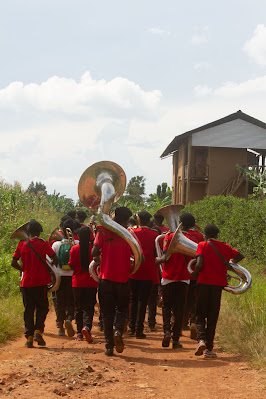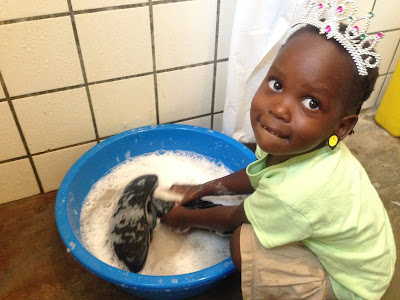Despite what many at Noah’s Ark may think—or possibly even many around the world who know me—I don’t know much about dance, ballet or otherwise. After nine years of ballet training as a girl, I know my toes and knees and hips are supposed to point out and I know my hands are supposed to stay loose and I know how to walk with perfectly pointed toes, but I have forgotten at least half of the positions and moves I have ever learned and more than that number of French names for those moves. A classical ballet dancer, and probably also my former ballet teacher, would shudder at my form as my hands cross the center line of my body and my knees occasionally point forward instead of sideways. Beyond ballet, my—can I even call it hip hop?—training has consisted of a one-week after school program in junior high, a few YouTube tutorials and lots of moves borrowed from my mom’s exercise videos. Oh yes, I am inspired.
I certainly don’t know much about step, as evidenced by the fact that here at Noah’s Ark, due to my mistake six years ago, we call it stomp. I admired the step team at PLU. I even saw them perform once.
And I one hundred percent don’t know much about leading a choir. I have never even been in a choir. My high school didn’t have one. My church didn’t have one. When I was in college and visiting my grandparents for Christmas, their church allowed anyone to join the choir for Christmas Eve. Several of us in the family thought it would be fun to try, and before we left for practice my grandma asked me, “So, do you sing alto, tenor or soprano?”
“What’s the difference?” I asked innocently.
Skepticism was written all over her face. “Hmm,” she said, “maybe you shouldn’t come with us after all.”
I still went. I think I was a soprano, but I’m not sure. Perhaps she had a point.
So, with my boatloads of inexperience, what made me think it was a good idea to throw 43 teenagers together onstage and try to whip up a concoction of ballet, step/stomp, keyboard and five-part choir? To be honest, whether or not it was a good idea never crossed my mind. Probably for the best.
I can’t remember the last time I had to actually look for a song to dance to. What normally happens is that I hear a song somewhere, and in the course of hearing it the first time—or the tenth or twentieth time, if I become obsessed right away—I see part of a dance. It might be one specific move, or the position of different groups of people onstage, or sometimes one specific person the song reminds me of who I hope can take the lead role. But that one thing takes hold, and then it grows. Before I have my first dancers, at least half of the dance is choreographed. And before we have performed, my mind is already planning the next one to begin. It is a huge lesson in patience, as I currently have a backlog of five different songs that have taken root in my mind and know that between upcoming Easter productions and school holidays I need to wait until May to get my next group together. Oh, the agony!
For the past three weeks, I have been meeting with three separate groups—ballet, stomp, and choir—to prepare a song to present together in church. This is the first time we have sung a song live (and very likely the last). Our practices would have been more efficient if we had spent the full 60 minutes after taking attendance only practicing exactly what they were going to do onstage. Maybe that’s how the professionals do it—I would’t know. But before presenting a song to the rest of the church, I wanted to make sure all three groups had a handle on the essence of the song. What exactly were they communicating? What message were they trying to share, and were they also receiving that message for themselves?
The first practice, I gave them a copy of the song lyrics and written homework about the perspective and content of the song itself. How can they present something to the congregation that they themselves do not understand? Through their answers we started getting to the heart of the issue.
Assignment: Describe the struggle the writer of God Only Knows is going through.
Answers (I will spare you some time and not give you all 43):
“They are trying to heal from something which won’t just heal overnight and they are learning how to trust in God’s unconditional love.”
“The writer has struggles and problems that never leave her mind even when sleeping… Nobody knows how much she’s struggling to pass through every challenge except God and she even wonders what kind of love God has for her to never give up on her.”
“I think the writer of God Only Knows has a deep fear in their heart and they have troubles and hard feelings that they would want to share with others around them but the writer fears and has worry that nobody can understand, believe or even help. Through the story of hardship the writer is going through, he still has hope and encourages the people receiving the message that only God knows everything that is going on everywhere, anywhere, no matter what, He is there to help.”
That was just our beginning.
The homework from our second practice was my favorite: Write about a time in your life when this song could have described you. You can tell about what you were going through, what was so difficult, how God was there for you, if you doubted God, how you still knew God was an awesome God who loved you, or what you learned about God. Tell your story.
I asked them to tell their stories. And they did.
Anyone who has had me as a leader in any capacity can tell you I am a stickler for timekeeping and discipline. In my dances, that means being ready in time, to the minute. For every minute you are late, you owe me one push-up. Of course this ends up meaning that the boys can afford to be more late than the girls because a boy can crank out 20 push-ups in the time a girl struggles through 3 (this is not me being sexist; this is me communicating direct observations from my practices), but the principle is the same: Don’t be late. In addition, I only count someone as present once they have handed me their completed homework. If they still need to finish it, they sit to the side and write, and the moment they had it to me I tell them how many push-ups to do before joining practice. (I’m sure some of these students wish they had an African dance teacher who operates on African time.)
A few minutes into one practice, one of my dancers approached me and apologized for being late. When I asked for her paper, she said she didn’t have it. I raised my eyebrows. She explained: “Auntie Katie, I have started it, and I am working on it. But every time I start writing, I start crying. It has been very difficult to finish. Please let me do it after practice and I will bring it to you tonight.”
It was three days before I saw the paper. Upon reading it, I came to understand that those were an important three days of healing for her. After taking three times the amount of space I had given the students to write their stories, hers ended with this: “I really appreciate God for giving me this opportunity to share this pain because it was eating me up emotionally. I now feel that I am somehow okay. But I hope I will be fully fine. Thank you!!”
There is a scene in the movie Freedom Writers where a teacher had given a similar journaling assignment to her high school class, and then sits to read their personal stories one by one. The students flash through the screen, narrating their own stories of struggle as the teacher begins to understand the burdens each of her students carries around with them every single day.
I was brought to tears as I sat in the library reading through story after story of hardship, praying no one would come to borrow a book so I wouldn’t be interrupted and have to show them my tear-and-mascara-stained mask. An auntie who abused with a stick and with her words… a family preparing for the death of a beloved with cancer… a seven-year-old who was forced to mop a dormitory with poop as a punishment… someone locked in a room for three days fearing to go to jail… siblings who were in an accident together and only one survived… a stepmother insulting the biological mother in the children’s presence… a father beating his child for asking to go to church… the list goes on.
I would never have guessed, based on the smiles and goofiness and normal teenage behavior that showed up for practice every day, that these kinds of stories lay underneath the surface.
Throughout the course of the three weeks, everyone shared their testimony with the group. The testimonies began with the painful stories they had written, but always concluded with how God had used that time to prove himself faithful to them or to show them his love for them. Through every single story, we heard how God used it for good. The pain, the struggle, the loneliness, the abuse. By the end of each one, every single student was keenly aware of his presence and power in their lives.
Again, I won’t share all 43, but here is a sample of the goodness of God we heard from one another:
“I don’t know much, but this much I do: At times I felt that God was not with me. Now I see that I was wrong. God has never left me behind. He saved my brother’s life. I thank God for what he did to us and my family.”
“I don’t know much, but this much I do: In times of temptation, when the devil tries to control you to do evil, just know God is able to forgive you and take you back to be his son or daughter.”
“I don’t know much, but this much I do: When I was young I was always sad and miserable, but now I thank God that I am always happy and I enjoy the presence of God since I joined his family.”
“I don’t know much, but this much I do: He never forgets his people, even when they tend to forget all about him and his deeds… He will run to you like he ran to me.”
I don’t know much about these teenagers—these teenagers who have gone through fire and have come out the other side resilient, faithful, and joyful. I don’t know much about their pasts or even their presents. I certainly don’t know much about their futures. I am often reminded that in the grand scheme of things I don’t even know much about God. But a few years ago, God spoke to me specifically about the teenagers in this organization: “Don’t underestimate the power of my Spirit in them.”
I don’t know much, but this much I do: God’s Spirit is powerful in them.




































